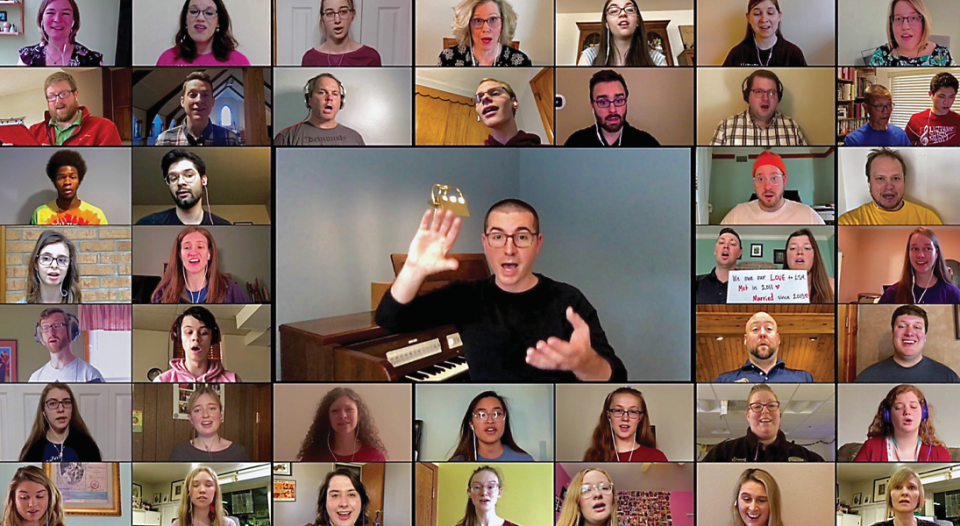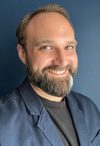When Chad Fothergill arrived on the Valparaiso (Ind.) University campus as a student of the Lutheran Summer Music (LSM) Academy & Festival in 2000, he had no inclination of his future vocational calling as a cantor.
But LSM changed that.
“It opened to this rural teenager a treasury of musical possibilities, of what could happen when a community was formed around shared song and shared experience,” he said.
Today, Fothergill serves as cantor for LSM and is earning a doctorate in musicology from Temple University, Philadelphia. This kind of transformative experience with LSM isn’t uncommon, report staff and alumni, many of whom credit the program as the starting point of their careers.
Founded in 1981 to celebrate and extend the musical heritage of the Lutheran church, LSM offers around 150 high school students the opportunity of advanced musical instruction, performance and intentional community. The program has rotated from one Lutheran college campus to another, though since 2017 it has been hosted by Valparaiso.
“We have these three main pillars of our program that we try to put equal emphasis on,” said Thomas Bandar, LSM executive and artistic director. “One is musical excellence—music at a high level. Two, a nurturing community, so it’s not a place for competition but a place for people to come together and support each other. And three, Lutheran faith, and that really comes out, especially, in what some people would call traditional liturgical practices and hymnody and sacred music.”
Bandar thinks LSM has a responsibility to pass along these Lutheran traditions to the next generation. But the program doesn’t emphasize these practices only for the sake of tradition, Fothergill said, adding, “Rather, we do this because a Lutheran heritage of music is attuned to the work of teaching and repetition, of forming faith for a lifetime. Like a treasured family keepsake or recipe, it points beyond the ‘I’ or ‘me’ and past the here and now, and helps form durable and lasting connections.”
“A Lutheran heritage of music is attuned to the work of teaching and repetition, of forming faith for a lifetime.”
Music and relationships, equal partners
For four weeks every summer students from across the country, with different backgrounds and different church experiences, come together at LSM to form meaningful connections. Many return each year they’re in high school. “We hear time and time again that ‘they found their people,’” Bandar said. “They found where they feel like they belong.”
Michael Schaner, an LSM alum who serves as director of music ministries at St. Luke Lutheran Church and as collaborative staff pianist and university organist at Carroll University, both in Waukesha, Wis., finds that his LSM experience continues to impact his work and relationships.
“LSM gave me lifelong friendships through our music-making for a month at a time; a deepening of my faith life through the worship, daily prayer and worship services; and relationships with other campers and faculty musicians that continue to grow as I meet more and more LSMers in my work as a Lutheran church musician,” he said.
Each morning, the entire LSM community gathers for a worship service. Students then rehearse and attend classes. Nearly every evening, they either perform in or attend a concert or a recital. Then the community gathers again for an evening prayer service.
Students make their deepest connections through these shared experiences and rituals. “LSM prides itself on being an intentional community, where you live, pray, eat, sleep, rehearse and relax alongside the same people you make music with for several hours per day,” said alum Brita Moore-Kutz. “In other words, it makes music and relationships equal partners.”
Moore-Kutz, a cellist who attended Luther College in Decorah, Iowa, and now works in nonprofit communications, found that LSM showed her “the importance of faith communities, not just for strengthening your belief in God but for finding love and belonging in your life.”
Although COVID-19 has impacted LSM’s usual programming, it has also allowed for new communities and creative opportunities, Bandar said. Over winter, LSM launched online programs, which removed barriers to attendance for some students. This summer, it’s offering what it expects will be a one-time dual track of in-person and online programming.
Regardless of the shape the programming takes, Bandar’s vision for LSM remains the same: “Here’s a group of 150 young people who are enthusiastic about liturgy and sacred music and want to lead that process back in their home congregation when nobody else might be taking that up. It’s really renewing that specific congregation [and] these essential elements of the church too. And that’s what happens quite often.”





